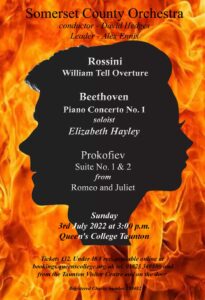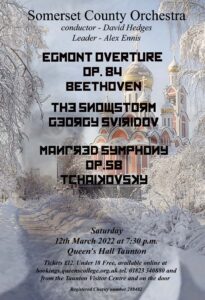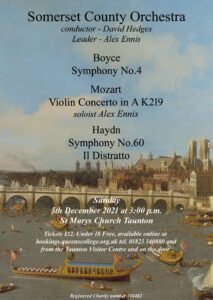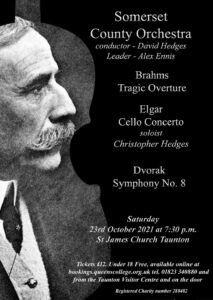July 3rd 2022 – Queen’s College, Taunton 3.00pm
Conductor – David Hedges
Soloist – Elizabeth Hayley
Rossini – William Tell Overture
Beethoven – Piano Concerto no 1
Prokofiev – Suite no 1 & 2 from Romeo and Juliet

March 12th 2022 – Queen’s College, Taunton 7.30pm
Conductor – David Hedges
Beethoven – Egmont Overture
Georgy Sviridov – The Snowstorm
Tchaikovsky – Manfred Symphony

Review: ‘Heroic Efforts’
A disappointingly sparse audience was in Queen’s College Hall last Saturday for the first Somerset County Orchestra concert of 2022. While it did allow for easy social distancing, it was a shame that more people did not come to what was an evening of great music making.
David Hedges directed affairs as usual, and, as usual had everything under splendid control. His forces were large and the filled the Queen’s stage, a wonderful sight. A dear friend of mine, now sadly departed, said that there was no more wonderful sound in the world than an orchestra tuning up, and how right he was.
The evening started with an old favourite, Beethoven’s ‘Egmont’ overture. This is actually one of ten items Beethoven composed to go with Goethe’s play Egmont but only the overture is still played regularly. The solid and solemn opening chords were followed by slightly tentative entries from strings and woodwinds, but their confidence soon improved. In the first allegro section the balance was a little wind heavy, but this was sorted out on the repeat. When the coda arrived, the whole thing took off! Taut, energetic playing produced an exciting sound and the work charged to a thrilling conclusion. This is one of the composer’s most popular short works and David and his players did it great justice.
I confess to never having heard of Georgy Sviridov as a composer, nor, while wearing my amateur astronomer’s hat, of the asteroid named after him! Although a 20th century composer, his musical style is more akin to the late 19th and “The Snowstorm”, a set of nine short episodes, contains nothing to shock the ears. An opening ‘troika’ had a lovely woodwind tune over thrumming strings and the robust middle section was beautifully played. A waltz was next, the theme reminiscent of the one from ‘Masquerade’ by Khachaturian – Sviridov’s has a rather rustic quality and it is definitely Russian not Viennese. The three sections which followed were all pastoral in nature, and we heard lovely woodwind and string playing throughout. The second of these, ‘Romance’ suggested a rather tragic romance, with lovely duets between solo violin and piano and solo ‘cello and woodwind.
In total contrast the very military sounding ‘March’ sounded more middle Europe than Russia, and was definitely for parade-ground display rather than marching off to the horrors of war – a real foot-tapper, very engagingly played. The section entitled ‘Wedding’ was a real curiosity – sombre and mysterious, not at all jolly or celebratory. Perhaps the outcome of the less than joyous romance earlier? The very odd harmonies did tax the intonation of the strings in places – the solemn ending section bore a resemblance to the texture and harmonies of Russian Orthodox chant and was richly played. The work ended with slightly modified restatements of the ‘Troika’ and ‘Waltz’ sections, the orchestral textures being built up layer by layer, becoming louder and more intense, before a lovely, quiet close. This is music I would listen to again, and David and the orchestra are to be congratulated for their fine advocacy of it.
After the interval we heard the massive ‘Manfred’ Symphony by Tchaikovsky. Not in the numbered canon of his better known symphonies, this programme work was composed between his two most popular, numbers 4 and 5. It is in four sections, based on the poem by Byron (1817). This work is played far less often than any of the rest of Tchaikovsky’s symphonies, and there may be reasons for this. Being ‘programme music’, trying to tell a story, it is episodic in nature. It lacks the coherence and flow of the two symphonies on either side of it, and it has neither the drive, drama and urgency of the 4th nor the lush romanticism of the 5th.
That said, David and the SCO did a cracking job of presenting the piece, and any longueurs I felt can be laid at the composer’s door. The opening Lento lugubre (I’ve never come across music being described as lugubrious before!) was wind only and was played beautifully – when the full orchestra joined the playing was very passionate and the dramatic coda to this movement produced a wonderfully solid and coherent orchestral sound.
The spirited and vivacious opening to the second movement was expertly handled by the woodwinds, and the quickfire arpeggios with harp interjections were very nicely done. The later reflective, pastoral theme from strings and harp could have done with a little warmer sound from the violins, but the sound improved when the woodwinds picked up the tune. In the third movement we again heard lovely woodwinds over strings for the tranquil pastoral theme and the later horn calls were expertly realised.
In the finale Allegro con Fuoco the sonority of the brass was not quite matched by the strings at first but they dug their bows in later and balance was restored. This section is supposed to represent a demonic orgy in the underworld, but Tchaikovsky’s music seemed a little too refined for that! Mussorgsky’s ‘Night on Bare Mountain’ does it better. I loved the fugue section in the middle – well played by all sections and beautifully balanced, based on a bacchanale-like theme. The frantic coda produced some powerful playing and the final chorale with added organ was a sonorous and thrilling episode. The tranquil and consoling ending, representing the death and final release of the tormented Manfred brought a fine performance to a close.
I still can’t work up a lot of enthusiasm for the piece itself, but I congratulate David and the orchestra for giving it an airing and such worthwhile advocacy. The audience size was a disappointment – here’s hoping that the Covid fears will have lessened by July, when the orchestra’s next concert is scheduled.
Harold W. Mead
14th March, 2022
December 5th 2021 – St Mary’s Church, Taunton 3.00pm
Conductor – David Hedges
Soloist – Alex Ennis
Boyce – Symphony No4 in F major
Mozart – Violin Concerto in A K 219
Haydn – Symphony No 60 Il Distratto

October 23rd 2021 – St James Church, Taunton 7.30pm
Conductor – David Hedges
Soloist – Christopher Hedges
Brahms – Tragic Overture
Elgar – Cello Concerto
Dvorak – Symphony no 8

Review: ‘The Happy Return’
If I may borrow a title from C. S. Forester it was a very good to see St. James’s Church well filled for the return of live music making by the Somerset County Orchestra conducted by David Hedges. It’s been too long since this fine ensemble last entertained us with great music and it was a joyful occasion. The programme was a conventional ‘overture, concerto and symphony’ menu, but the musical contrasts presented made it an evening of great interest, musically.
The concert opened with the 1880 ‘Tragic’ Overture by Brahms. Perhaps not one of his best known works, but it enjoyed good advocacy by the orchestra. It took a little time for the sound balance to settle – things were a bit brass and timps heavy at first, but it did improve and we began to hear the strings properly. I really enjoyed the middle section, pizzicato strings against wind – this was well done. The build up to the coda and ending brought the best ensemble playing, well balanced. The conductor kept the tension building towards the conclusion and this was a promising start to the evening.
The Elgar ‘Cello Concerto is one of the best-loved works by an English composer and playing it must therefore be quite daunting for any soloist. Christopher Hedges is no stranger to the musical scene of Taunton (there were many in the audience who could say ‘Ee, I remember ‘im when he were nobbut a nipper’ or whatever the Somerset equivalent is). In any event, we heard a performance of great passion and maturity, and the Hedges clan (four in this concert) should be very proud. The impassioned opening was splendid, and the soulful, sinuous melody which followed was beautifully played by soloist and string section. The full statement of that tune produced a solid ensemble sound, and the second subject had lovely interplay between soloist and orchestra.
There was excellent double stopping in the Lento of the second movement and although the scampering scherzo which followed had some minor intonation lapses by the soloist it was very impassioned and energetic. The soulful Adagio was the highlight of the performance, perfectly balanced with genuine nobility of sound from Christopher. The allegro tune of the final movement was well played, the middle section skilfully held together by the conductor, and the final recollection of the pathos of the Adagio wonderfully realised by both soloist and orchestra. They exchanges between them of the heart-rending phrases led to a conclusion containing both tragedy and solace. This was a lovely performance and it deserved the rapturous applause it received.
After the interval, we were taken to Bohemia for a fine performance of Dvořák’s 8th symphony (1889), written before the composer’s trip to the USA, and the smash hit of his ‘New World’ symphony. Again there was a tendency for the brass and percussion to overpower the texture at the start, the strings not being as prominent as they should have been. The flute birdcalls were beautifully played – in fact the woodwinds were consistently good throughout.
The string sound, occasionally a bit thin in the higher positions, was nevertheless very good in the second movement, the middle section, a pastoral woodwind tune over descending string figures being particularly lovely. The third movement flowed very well and the final molto vivace was very well done, despite some rather over-enthusiastic whacks on the timpani.
After a rousing trumpet fanfare, David took the opening tune of the finale a little bit slower than I have heard other conductors do, but this in fact worked well, giving greater interest when the theme was later played much faster. My congratulations to the french horns for playing those fiendish bars in that passage so well – and several times!
The slower section produced a lovely, mellow orchestral sound leading to a spirited and exciting finish to the work and to the evening.
Overall this was a brilliant resumption of the fine music making we have come to expect from the SCO and its conductor. There were a few minor insecurities in places in the strings, but nothing I heard detracted from my enjoyment of a first class concert. Welcome back!
Harold W. Mead 25/10/2021
